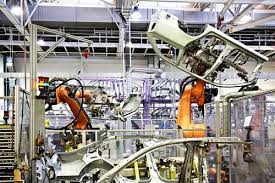Mechanical engineering is one of the broadest and most flexible areas of engineering since it focuses on how things move. Because of this, mechanical engineering is relevant to practically every element of contemporary life, including the incredibly complex machine that is the human body. A Mechanical engineer is responsible for the creation, development, and testing of mechanical devices. All things mechanical, biological, or otherwise mobile are fair game for them. This article will go over what mechanical engineer does (job description), how much they make (salary), what courses are required in mechanical engineering, and how to get an internship in the field.
What Is Mechanical Engineering?
Mechanical engineering, in its technical sense, is the application of engineering ideas and problem-solving approaches to the process of bringing a physical product to market. Mechanical engineers apply the laws of motion, energy, and force to their work to ensure that their designs are safe, efficient, and reliable without breaking the bank.
A Mechanical engineer plays a crucial role in society. Because mechanical engineers focus on developing tools to solve problems faced by people. Mechanical engineers have contributed to almost every aspect of modern life, making them better places to live. Health care, energy, transportation, world hunger, space travel, climate change, and other issues need immediate attention and long-term planning.
Furthermore, mechanical engineering education has broad applicability because of its foundation in so many other fields’ unique difficulties and innovations. A Mechanical engineer can create a variety of tools and systems to address this wide range of needs. This covers a wide variety of scales, from whole vehicles and satellites to individual switches and sensors. Mechanical engineers are crucial for any project requiring production or, more generally, any project involving moving parts.
What Is a Mechanical Engineer?
A mechanical engineer is an expert who contributes significantly to the manufacturing, automation, computer and electronics, biotechnology, automotive, and aerospace sectors of the economy. All kinds of mechanical machines, tools, and engines are created, developed, built, and tested by them.
Everything from tiny components like connections to massive machines like drill presses is within the scope of expertise for a mechanical engineer. They work on the whole process of making something, making sure it looks good, works well, and lasts.
Also, transmissions, engine components, aviation engines, control systems, prosthetic devices, disk drives, printers, semiconductor tools, sensors, gas turbines, wind turbines, fuel cells, compressors, robots, and machine tools are all examples of items that a mechanical engineer can design and build.
Types of Mechanical Engineers
The field of mechanical engineering offers a variety of subfields, including but not limited to:
#1. Controls and Robotics
The term “controls and robotics” is used to describe the science of improving robotic systems. Artificial technology and efficient mechanical robots are two areas of focus for an engineer in this field. Spacecraft that rely heavily on automation and mechanical parts may be the subject of their studies. In order to learn how to program robots, students may also take courses on probability, statistical methods, and algorithms.
Aerospace companies often hire engineers with this focus, who may develop spacecraft or AI systems to aid such projects. However, these professionals may also find work in the aerospace, automotive, or military sectors.
#2. Mechanics of Materials
The study of solid and soft materials and the dynamics of these material systems in applications such as manufacturing, energy, and biomedical engineering constitutes the mechanics of the materials subfield. Students in this field of engineering might pursue courses that include finite element methods in mechanical design. They can also study the solid and soft materials used in the development of biomaterials and medical devices.
Engineers with expertise in the mechanics of materials may find work in the manufacturing sector, where they can help create more effective processes and equipment. They can also use their material science knowledge to pursue careers in design and development.
#3. Automotive Design
The art of designing and creating motor vehicles is known as “automotive design.” The focus here is on analyzing and improving mechanical systems, such as automobiles. This area of expertise combines engineering with the creative process because it involves the introduction of new items into the marketplace. Learning about material handling systems, tool path planning sensor systems, and quality control will help anyone interested in automobile design create better products.
The primary career goal of those who study automotive design is to find employment in the automobile industry as engineers.
#4. Machine Design and Development
The field of machine design and development is quite comparable to that of automobile design; however, its scope is far wider. Washing machines and cranes are two examples of such machinery. Engineers who focus on machine design and development could take courses in modeling and materials science to learn how different substances respond to stress. They are also capable of doing the math necessary to figure out how to optimally distribute mass and use aerodynamics for maximum efficiency and design.
The automotive and aerospace industries are only two examples of the many that could benefit from the expertise of engineers with this focus. Career opportunities exist for them in both industry and technology.
#5. Materials Science and Engineering
Problems in nanotechnology, biotechnology, and energy all fall under the purview of materials scientists and engineers, who work at the crossroads of chemistry and physics. The criteria for material selection, production, and analysis of components in these solutions are taken into account. To ensure they are aware of the behaviors and repercussions of certain materials, students in this field of study may take coursework on polymeric materials or the thermodynamics of materials.
A materials scientist or engineer might find work in the medical field, where they’d be responsible for coming up with novel approaches to old problems. Companies specializing in chemical engineering are other potential employer.
Mechanical Engineer Job Description
A Mechanical engineer creates, tests, and puts in place mechanical systems. This can include everything from the parts of mechanical heart valves to the boilers in high-rises to the robotic equipment used by astronauts in space.
Also, mechanical engineer does a wide variety of work, but they are usually motivated by the need to find solutions to existing issues. Mechanical engineers will apply their expertise in mathematics, physics, and technology to analyze the issue at hand, then investigate, develop, and implement a solution.
The usual job responsibilities of a mechanical engineer are:
- Checking the needs of the project.
- Testing and evaluating mechanical systems, machinery, and machinery.
- Coordinating with clients and supervisors to settle on costs, deadlines, and specific requirements.
- Refining products and services through regular updates and fixes.
- Making use of CAD (Computer-Aided Design) programs.
- Communicating with vendors.
- Doing some investigating.
- Making plans and carrying them out for testing.
- Conducting risk analyses.
- Introducing creations to clients and executives.
- Product development includes testing, analyzing, tweaking, and re-testing.
- Reporting and record-keeping writing.
- Assistance with technological matters.
- Data interpretation and analysis.
- Controlling time, money, and human resources.
The typical office hours for a mechanical engineer is 9.00 am to 5.00 pm, with sporadic evening and weekend work.
Mechanical Engineer Skills
Mechanical engineers benefit greatly from possessing a wide range of soft skills in addition to their technical expertise. When reviewing resumes for mechanical engineers, these are some of the most sought-after skills:
#1. Focus on Specifics
A mechanical engineer can increase the reliability of their systems by paying close attention to every detail. Engineers in the mechanical field need this ability to design systems that are reliable, secure, and effective. Quality checks are another area in which mechanical engineers excel because their attention to detail helps them spot potential problems and identify places for enhancement.
#2. Communication
A mechanical engineer benefits from excellent communication skills while attempting to educate non-specialists on the mechanics behind their work. However, clients are kept up to date on the development of new items, and the company also takes into account customer feedback. Mechanical engineers rely on their interpersonal and communication skills while instructing subordinates or selling their colleagues on the importance of completing certain jobs first. A mechanical engineer needs not only strong oral communication skills but also the ability to clearly and concisely write technical reports in accordance with the standards of various fields.
#3. Leadership
Mechanical engineers with strong leadership skills are in a position to provide projects with expert direction. They can use this information as they update clients on the project’s progress. A good leader keeps everyone in the engineering team focused on the ultimate result, provides guidance to those who need it, and motivates everyone to strive toward it. Gaining a reputation as a leader in the field can help a mechanical engineer climb the corporate ladder and assume greater responsibilities.
#4. Problem-Solving
Mechanical engineers who are also adept problem solvers often produce the most ground-breaking innovations. They need to be able to improve the efficiency of operations because they spend much of their time finding solutions to problems for customers and employers. Prototype testing is a common practice for identifying problems and creating fixes. Also, a mechanical engineer analyzes issues in order to develop solutions and accomplish goals.
#5. Composure
Pressure-handling skills are a must for a mechanical engineer. They often work under pressure to meet strict deadlines, yet maintaining composure is essential to producing quality results. They may also feel pressure to deliver results that satisfy their customers and their company. In addition, mechanical engineers who are able to keep their emotions in check are better able to deal with setbacks, stay on task, and maintain self-assurance in the face of uncertainty.
#6. Adaptability
Mechanical engineers are always developing innovative methods to make tools and machines. They are able to tolerate change and identify ways in which established systems might be enhanced because of their adaptability. They are adaptable when things don’t go as planned and take pleasure in coming up with novel, powerful ways to boost their client’s success.
#7. Maths Skills
Math is a useful tool for a mechanical engineer in many design processes. Math, statistics, calculus, and trigonometry are all included in this category. They might utilize algebra in creating computer software algorithms or physics formulas in calculating the strength of a product. Students majoring in mechanical engineering typically take a number of mathematical courses in college.
Salary of a Mechanical Engineer
As of the 27th of June, 2023, a Mechanical Engineer in the United States may expect to earn an average salary of $102,508.
In case you’re trying to figure out how much money you’ll be making, that comes out to about $49.28 per hour. This is equal to $8,542 per month, or $1,971 per week.
Furthermore, ZipRecruiter reports that the yearly salary range for a Mechanical Engineer in the United States is from $80,000 (25th percentile) to $128,500 (75th percentile), with the highest earners (90th percentile) making $139,000. There may be many prospects for growth and increased compensation depending on skill level, location, and years of experience for a Mechanical Engineer since the average salary range varies substantially (by as much as $48,500).
Recent ads on ZipRecruiter indicate a brisk hiring climate for Mechanical Engineers in Chicago and the surrounding area. In your region, a Mechanical Engineer can expect to make $102,375 annually, which is 0% less than the median annual salary of a Mechanical Engineer across the country of $102,508. pays its mechanical engineers more than any other state in the union.
In addition, ZipRecruiter regularly checks our database of millions of active jobs posted locally throughout the United States to estimate the most accurate annual salary range for Mechanical Engineer positions.
Do Mechanical Engineers Make Robots?
Yes. Mechanical engineers play a key role in the production process by designing and operating the robots used in product assembly. Engineers in this field are responsible for creating robots that can interact with other machinery and systems in production, as well as perform their tasks effectively and securely.
Mechanical Engineering Courses
Professional growth in the field of mechanical engineering is just as important as a solid academic background in the subject’s fundamental ideas. Courses in Mechanical Engineering are taught at universities and colleges all around the world, and they cover the most cutting-edge methods, tools, and technologies used in the field. Some mechanical engineering courses lead to a certificate or diploma, while others can be applied to a bachelor’s, master’s, or doctoral degree in the field.
However, courses in mechanical engineering can be taken either full or part-time. Because of this diversity, colleges, and universities are able to meet the demands of a wide range of pupils. Courses in mechanical engineering often focus on a single subfield, with students required to attend lectures and seminars on the topic at hand and complete laboratory exercises and design projects to demonstrate their mastery of the material.
Since each school’s mechanical engineering program is unique, it could be helpful to fill out the inquiry form on the school’s information page about a program that piques your interest.
Overview of the Best Mechanical Engineering Courses
Here are some of the top mechanical engineering courses you need to study to excel as a mechanical engineer.
#1. Introduction to Engineering and Design
This course will introduce you to the fundamentals of engineering and the steps involved in engineering design, from brainstorming and research to generating options and building prototypes.
Biomedical, Chemical, Civil, Electrical, Materials, and Mechanical Engineering are just a few of the specializations covered in this survey course. You’ll get to hear from professionals in the area as they discuss the unique issues faced by engineers working in their respective fields of specialization.
Also, the “Design Challenge” is an opportunity to put what you’ve learned into practice by creating and testing a prototype (the course can be taken with a focus on either computer-aided design (CAD) or a physical build) that addresses a real-world engineering issue.
If you want to learn more about engineering and how you may apply it to your present employment, this course is a great starting point.
#2. Thermodynamics
Students majoring in mechanical engineering should take ME209.1x, a foundational thermodynamics course. We will learn the specific definitions of the thermodynamics terminology and concepts we encounter. Materials characteristics and the first, second, and zeroth laws of thermodynamics will be investigated. There will be a wealth of beneficial connections found. Issues covered are:
- Basic concepts and definitions
- Open thermodynamic systems
- The first law is energy, and the heat interaction
- The Zeroth law, temperature, and scales of temperature
- Properties of gasses and liquids, equations of state
- The second law, thermodynamic temperature scales, and entropy
- Relations between properties
- The work interaction
The focus will be on creative solutions to issues. The work required to complete the activities by the students will be substantial.
Mechanical engineering majors will benefit most from this course. However, it will likely be helpful to other people (especially engineers and scientists). The training has also been beneficial for thermodynamics educators.
You can start taking this course whenever you like because it is self-paced. In addition, you can complete in 12 weeks at a normal rate of study (about 10 hours per week).
#3. Solidworks Cad Fundamentals
When it comes to mechanical design and engineering, SOLIDWORKS has been the gold standard for over 25 years. Conceptualizing, designing, validating, communicating, managing, and transforming your innovative ideas into exceptional product designs is a breeze with SOLIDWORKS’ intuitive 3D modeling and product development tools.
This course will teach you how to utilize SOLIDWORKS 3D CAD by utilizing its various capabilities, such as:
- There are more than a hundred videos made by SOLIDWORKS specialists to help you learn how to use the program. In the past decade, approximately 250,000 copies of SOLIDWORKS Essentials have been sold. This book was written by the same SOLIDWORKS professionals.
- There are over two hundred quiz questions to make sure you’re on the right track.
- There are more than 30 sample problems that will put your skills as a designer and editor of sketches, parts, and assemblies to the test. If you opt for the Verified path, several of these drills will be graded.
You will be ready to take the Certified SOLIDWORKS Associate (CSWA) test when you finish this course. Obtaining a SOLIDWORKS certification is one way to demonstrate that you have the skills necessary to utilize the software effectively. Also, users who want to demonstrate their proficiency to potential employers should begin with the CSWA certification.
#4. Engineering Drawing
Fundamental to the study of engineering technology, “Engineering Drawing” covers both the theory and practice of engineering design. The first section will provide students with a foundational understanding of engineering by introducing the concept of projection and its use in the interpretation of technical drawings. The second goal of these drills is to familiarize pupils with the process of making different kinds of mechanical drawings.
Furthermore, this course will introduce students to fundamental design representations based on the idea of projection, including 2D views, freehand axonometric sketching, and 3D solid modeling. Freehand sketching, instrument sketching, and computer-aided design (CAD) are all part of the process. The primary goals are to teach students to think in three dimensions, to draw their concepts to scale and to come up with novel ways to make shapes that can be used in engineering.
In addition to preparing students for advanced study in mechanical engineering, this course serves as a requirement for topics including machine design and manufacturing.
#5. Sustainable Energy
An important global concern, climate change calls for collaboration at multiple scales and a focus on systems engineering. In Sustainable Energy, you’ll join thousands of students from across the world in analyzing conventional and renewable energy generation technologies, learning about their global deployment, and forecasting their impact on the energy landscape of the future. Technologies include photovoltaics, wind energy, batteries, hydropower, nuclear power, and biofuels.
You will also learn about the economic, political, and social factors that must be considered while designing an energy project, in addition to the technical aspects. In the face of scientific ambiguity and distinct geopolitical challenges, it will take the combined efforts of professionals from a wide range of disciplines to chart a course toward decarbonization. You will learn about cutting-edge resources and methods for establishing consensus among stakeholders and uncovering avenues for decarbonization in concrete situations.
Michael Golay, a professor of nuclear science and engineering at MIT, is the course’s instructor.
Which Engineer Has the Highest Salary?
A petroleum engineer has the highest salary. With a national average salary of $124,247 per year.
Petroleum engineers collaborate with other types of engineers to devise methods for extracting oil and gas from the ground. These materials can also be recovered from decommissioned wells. The amount of daily drilling is tracked by these engineers. They also investigate many other drilling methods and technologies that can facilitate efficiency.
Which Course Is Best in Engineering?
Computer Science Engineering is the Best Engineering Course.
Computer Science Engineering is a field that focuses on the study, development, and management of software and hardware-based information systems. A computer scientist is a specialist in both the practical application of computing and its theoretical foundations. Computer science engineering is useful in many other areas, including electrical and electronics engineering, IT, software engineering, and more.
Mechanical Engineer Internship
If you want to pursue a career as a mechanical engineer, participating in an internship program is a great first step. The good news is that there are internship opportunities available for people of all backgrounds and interests.
However, internships in mechanical engineering can be found in a wide variety of fields, from civil engineering and manufacturing to aerospace engineering and robotics.
A bachelor’s degree (or relevant job experience) in mechanical engineering or a closely related discipline is usually necessary, and a 3.0 GPA is sometimes also sought after for entry. Knowledge of CAD programs and programming languages may also be desirable for future engineers.
An American citizen may be required to gain a security clearance for these internships, which may be full or part-time, on-site or remote. Internships in mechanical engineering, and the wider mechanical, electrical, and plumbing (MEP) industries, can be unpaid or compensated, and can sometimes even be used to fulfill course requirements.
Instead of receiving compensation, interns at nonprofits, government agencies, or educational institutions get vital experience and connections in the field. In contrast to unpaid internships, paid ones give financial compensation for your efforts but may require more expertise and skills. College credit can be substituted for or added to the internship experience for students who meet certain curriculum requirements.
Having practical experience and learning about the industry is crucial for every mechanical engineer internship.
How to Get the Best Internship Position as a Mechanical Engineer
Here are the best strategies to help you land your dream internship as a mechanical engineer.
#1. Obtain the Appropriate Education
Internships in mechanical engineering are competitive, and employers typically look for candidates with experience and a bachelor’s degree. Both a Bachelor of Technology (BTech) and a Bachelor of Engineering (BE) in mechanical engineering are available to you. While a master’s degree isn’t strictly necessary, it can increase your chances of landing an internship.
#2. Conduct Research
This may seem obvious, but according to research, it is actually quite widespread. Recent grads often apply for internships blindly, without first investigating the opportunities thoroughly. Therefore, it’s better to document it in writing.
The necessary thing to do is research the sectors that pique your interest and learn as much as can about them (their type, location, revenue, etc.). Create a list of 5–10 industries you’re interested in working in, and then create a list of internships in each industry, categorizing them by employment role, paid/unpaid status, letters of recommendation, and so on.
There are two considerations I’d like you to make when picking an internship as a mechanical engineer.
- Pick an Appropriate Company. My advice has always been to go with the mechanical engineering firm of your dreams. You’ll become more ambitious and able to make better decisions as a result. If you already know the firm you want to intern with, you have the option of applying directly to that company or to one of its manufacturers. Pick a company that encourages your professional growth.
- Don’t Chase the Bucks. Many of you try to find internships that pay at all times, and you should. A paid internship is ideal, but don’t allow the unpaid ones to slip through your fingers. The primary goal of your internship as a mechanical engineer, however, is to get practical engineering experience that will enhance your resume for future job applications.
In fact, a LendEdu internship survey found that students chose internships that would provide them with networking opportunities over those that paid more. The sample size for the survey was 720 universities.
#3. Acquire Valuable Abilities
Knowing the fundamentals of CAD, FEA, and other essential technical skills might be helpful in addition to possessing the required academic degrees. Improving your proficiency with spreadsheets and other presentation software is also highly recommended. Since interviews are sometimes a part of the selection procedure, polishing your verbal and interpersonal skills can’t hurt.
#4. Acquire Some Knowledge of the Concepts
Internships in mechanical engineering require more than just software expertise. Alternatively, as I indicated before, you could choose to intern for a company that supplies your ideal employer with components. Because of this, theoretical manufacturing subjects become more important to study.
If you want to improve your internship prospects, study the following three areas.
- Lean Tools. Lean Tools is the first and most important subject in production. The 5S system, Kanban, Kaizen, Jidoka, and other lean tools are used in every manufacturing organization. While mastery of every instrument isn’t necessary, a working familiarity with the most crucial instrument is a must.
- Production Techniques. During an internship in the manufacturing sector, you will be expected to learn about the many stages of the manufacturing process. You can pick them all up in a matter of minutes, maybe even ten.
- Quality Terms. Finally, I’d like to add studying various quality terminology like CAPA, COPQ, etc. As an intern, you will frequently be tasked with conducting quality audits and writing COPQ reports.
Internships are a great way to get experience and possibly land a job afterward. So, you won’t need to bother studying them if you already possess transferrable talents including good interpersonal, communicative, computational, managerial, and team-building capacities. However, having these abilities can provide you with an edge in today’s business world.
#5. Get Your Resume in Order
Include an interesting objective statement and highlight your relevant talents on your resume. Include in your resume any volunteer work, leadership responsibilities you’ve held, or related courses you’ve taken. Make sure to tailor your CV to each internship opportunity you apply for. You should incorporate search terms from the job description in your resume. Also read, What to Put on a Resume: 10+ Free Tips to Include in a Good Resume
#6. Create a Cover Letter
You probably don’t have much of a professional background, seeing as how you’re applying for an internship as a mechanical engineer. This highlights the significance of writing a captivating cover letter. Extend your interest in the position and the organization, and detail your qualifications in the cover letter. Describe some of your most important abilities and work habits. You may also include details on similar projects you’ve worked on in the past and the impact you have on their success.
#7. Do an Internship Application
You can begin applying for internships once you have prepared your résumé and cover letter. Beginning an internship early in your career can allow you to gain valuable knowledge and experience quickly. You can apply online through a company’s website or by sending a hard copy of your resume to the company’s physical address. Mechanical engineering students can use Indeed to search for internships and apply to various employers.
How to Become a Mechanical Engineer
Follow these guidelines to pursue a career as a mechanical engineer:
#1. Get A Degree
Employers often prefer candidates with at least a bachelor’s degree in mechanical engineering. Mechanical engineering is a broad topic, and there are many related areas in which you can pursue higher education. If you want to be eligible for licensing after graduation, you need to study at an institution certified by the Accreditation Board for Engineering and Technology (ABET).
Furthermore, courses in mathematics and the natural sciences can help you get ready for a job in mechanical engineering. You can also choose to focus on a subfield of mechanical engineering, like aeronautics, by taking the necessary classes. In a typical undergraduate curriculum, you might take courses like:
- System dynamics
- Fluid mechanics
- Thermodynamics
- Mechanical component design
- Engineering ethics
- Biomechanics
#2. Make Use of an Internship
Internships are an integral part of the mechanical engineering curriculum at many universities. You can still benefit from getting internship experience even if your school doesn’t mandate it. Engineering, manufacturing, and R&D industries typically offer internship opportunities. Working under the guidance of more seasoned professionals is a great way to put what you’ve learned in the classroom into practice during an internship.
A valid engineer’s license may be required for some positions. Make sure you follow the laws of your state by researching their prerequisites. To get certified as an engineer in several states, you must first pass the Fundamentals of Engineering (FE) exam administered by the National Council of Examiners for Engineering and Surveying. In addition, gaining a Professional Engineer (PE) license is a great way to set yourself apart from the competition once you’ve put in some time in the field.
#4. Think About Getting Certified
Earning credentials in a particular subfield of mechanical engineering is a great way to stand out to potential employers, however, it is not required. If you want to stand out from the crowd while searching for jobs, getting certified in your field is a great way to do it. The American Society of Mechanical Engineers is a common organization for mechanical engineers to get accreditation from. The following are some of the fields in which you can get certified:
- Advanced materials mechanics
- Stress analysis
- Dynamic systems
- Convection heat transfer
- Advanced control systems design
#5. Don’t Stop Learning!
After finishing a bachelor’s program, mechanical engineers can choose to continue their education and earn a master’s. Both degrees can be earned in a five-year combined program at some universities. While a bachelor’s degree will get you into the workforce, a master’s in mechanical engineering will give you a leg up on the competition. Earning a graduate degree can open doors to better employment and higher salaries. Do your homework on potential master’s degree programs and institutions before making a final decision.
Conclusion
In conclusion, mechanical engineers are in high demand because they are useful in a wide range of sectors, both industrial and otherwise. While the development of the first mechanical tools and engines could be seen as the earliest examples of mechanical engineering, the field really took off during the first Industrial Revolution.
These days’ mechanical engineers use computers and other electronic aids in the design, development, construction, testing, and upkeep of all manner of mechanical devices, engines, tools, and machines. Mechanical engineers have a significant impact on numerous sectors, from aerospace and automobiles to construction and medicine, thanks to their ability to think creatively and solve issues.
Mechanical Engineer FAQs
Does a mechanical engineer work on cars?
Yes. Mechanical engineers are the backbone of the transportation sector. They create bodyshells, wheelsets, and combustion systems for many kinds of vehicles, from 80-seater buses to single-seat F1 cars.
What type of engineers build robots?
The disciplines of electrical, mechanical, and computer engineering all contribute to the growing field of robotics engineering. It entails the process of creating robots from scratch. It’s also a practical design function in the realm of academic study.
Which is the toughest branch in engineering?
Mechanical engineering is said to be the toughest branch of engineering. Mechanical engineers, at their core, study and apply the fundamental principles governing the physical universe.
Similar Articles
- EXECUTIVE ASSISTANT VS ADMINISTRATIVE: Which Is Better?
- Externship vs. Internship: What Are the Key Differences?
- MENTORSHIP: Meaning, Programs, Quotes & Benefits
- PRODUCT DESIGNER: What They Do and How to Become One






